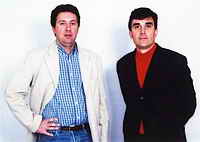Home > French Hostage Crisis Adds Tension to Headscarf Ban

By Tom Heneghan
PARIS - The kidnapping of two French journalists in Iraq has injected new tension into France’s debate over banning Islamic headscarves in schools just as Paris was hoping for a smooth start to the school year this week.
The Islamic Army in Iraq has given France 48 hours to revoke the controversial ban.
As French leaders scrambled to strategy meetings on Sunday morning, it seemed unlikely they would revoke the ban which has wide support among French voters. Even many French Muslims quietly support it as a way to check fundamentalists here.
Leaders of France’s 5 million Muslims reacted nervously, promptly denying any link between them and the kidnappers.
"The French Muslim community is absolutely innocent," said Dalil Boubakeur, head of the French Council of the Muslim Faith. "I beg that there not be any confusion between the French Muslim community and this odious blackmail."
The Union of French Islamic Organizations (UOIF), which has opposed the ban on headscarves and encouraged Muslim schoolgirls to defy it, said no "foreign force" had the right to interfere in French Muslims’ relations with the state.
Arabic television station Al Jazeera said on Saturday the Islamic Army in Iraq had given France 48 hours to abandon its "unfair and aggressive" ban.
It did not say whether the group threatened to kill its hostages, identified by Jazeera as reporters George Malbrunot and Christian Chesnot, if France did not comply.
Before this crisis broke, officials were quietly expressing confidence that the start of school on Thursday could go off without too many problems because of an "iron fist in a velvet glove" strategy they developed over the summer.
France passed the law banning conspicuous signs of faith in state schools last March in reaction to the growing influence of Islamist activists and mounting tensions between Muslim and Jewish youths in schools.
Criticized abroad as a violation of religious freedom, it won a boost in June when the European Court of Human Rights ruled in a case from Turkey that banning headscarves did not abuse human rights and was valid to fight fundamentalism.
DELAYED REACTION
Education Minister Francois Fillon has planned to defuse tension on Thursday by avoiding confrontations at the school gate — where television cameras can film girls being turned away — and dealing with challenges later behind closed doors.
"Any pupil who comes back to school wearing a symbol or type of clothing banned by the law will be allowed in," he said in an article for Catholic daily La Croix on Saturday.
"The principal will immediately start a dialogue with the pupil," he wrote. "This will not be a negotiation and sanctions for flouting the law will only be decided at the end of it."
The law, which specifically outlaws headscarves, Jewish skullcaps and large Christian crosses, allows head coverings if they are not of a religious character.
Fillon warned this loophole must not be exploited and school principals would have the last word on whether a head covering was a spiritual statement or a fashion accessory.
"The law will be applied without any concessions in the face of any attempt to twist it," he wrote. "We have to protect children against religious fundamentalism that tries to manipulate and marginalise them within their own school."
While the UOIF has indirectly encouraged schoolgirls to defy the law, a Strasbourg convert named Thomas Milcent — better known in Muslim circles as Doctor Abdullah — has set up a telephone hotline to advise them how to do it.
But he told Reuters that only about 10 girls were calling the hotline daily — not a large number if the pro-headscarf lobby wants to make a strong statement at the start of school.
Asked if he expected a stormy school opening, Milcent said: "Only God knows." (Reuters)
http://wireservice.wired.com/wired/story.asp?section=Breaking&storyId=913773&tw=wn_wire_story




